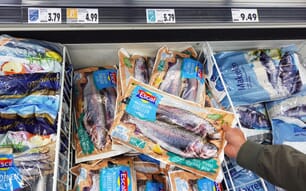The warning, issued by the David Suzuki Foundation and Living Oceans Society, came on the final day for public input into the Global Aquaculture Alliance’s (GAA) draft standards for salmon farming. The proposed standards are being criticized by both groups as being too weak to support any claim of environmental or social responsibility, or sustainable salmon farming.
“The GAA has proposed a set of standards that primarily require that the certified operation has complied with the law and is trying to do a good job,” said Jay Ritchlin, director of the marine and freshwater conservation program at the David Suzuki Foundation.
“While this may offer some value by discouraging the worst farming practices, it shouldn’t be confused with an indication of significantly improved social or environmental performance by these aquaculture operations.”
The GAA is creating a lot of confusion by promoting the standard as Best Aquaculture Practices (BAP) while also designing a standard that will certify a large majority of existing salmon aquaculture operations globally without any change in operations.
“Suppliers, retailers and consumers who are honestly concerned about the sustainability of the seafood they sell and consume should not be led to believe that this standard satisfies their concerns,” said Shauna MacKinnon, sustainable seafood campaign manager at the Living Oceans Society.
The GAA states on page 1 of its standard that “BAP standards…assure healthful foods produced through environmentally and socially responsible means.” However, the two groups say that the environmental portion of the proposed standards doesn’t meet the bar for two main reasons:
- Any salmon farm that essentially complied with government regulation and made some aspirational commitments would qualify for certification. Significant impacts from salmon farming on wild salmon and marine ecosystems have been researched and documented while local and national regulations have been in place. Conforming to regulations that have been demonstrated to be inadequate is not a mark of environmental responsibility.
- The GAA standard does not include any provisions to minimize the impact of disease and parasites on wild salmon. This issue, which is the subject of much peer-reviewed science, international research conferences and now a part of a Canadian Federal Commission of Inquiry, is clearly one of the most important impacts to assess in regard to the environmental responsibility of salmon farming, and it is virtually unaddressed in these standards.
“These standards suggest that most of the industry currently operates at a high level of sustainability and has effectively eliminated or minimized its threats to wild salmon and ecosystems. And that is simply not the case,” Mr Ritchlin said.
The groups say there is also a significant design flaw in the certification. GAA shrimp certifications, for example, have been predominantly granted to products that were assessed at the processing plant, not at the shrimp farm where the majority of environmental impacts occur. In other words, the GAA certification could apply to a processing plant rather than a farm site, and therefore doesn’t clearly tell the buyer whether a product’s performance was evaluated at the most relevant time and place.
“GAA certification might help buyers filter out the very worst actors from the supply chain, but that is not the same as achieving an acceptable level of sustainability,” Mr MacKinnon said.
Both the David Suzuki Foundation and Living Oceans Society are involved in multiple processes aimed at developing standards, improving technology and conducting assessments for sustainable seafood, including aquaculture operations. They note that the GAA’s standard-setting process and governance, while improved from several years ago, is still the one most closed to stakeholder input at key stages.
They are asking the GAA to clearly identify that the standard is not an indication of significant social and environmental improvement over basic regulatory compliance and to remove the option of certifying a product that has not been assessed throughout its production chain. The groups are also urging seafood buyers and sellers not to consider GAA farmed salmon as meeting commitments they’ve made regarding the purchase of sustainable seafood.

